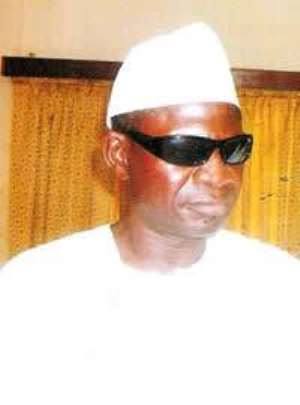
Dr. Henry Seidu Daannaa
Assin Owirenkyi (C/R), Feb. 20, GNA - The Ministry of Chieftaincy and Traditional Affairs will regularly train staff of the various traditional councils to enhance their performance and develop the chieftaincy institution.
Dr Henry Seidu Daanaa, Minister of Chieftaincy and Traditional Affairs, who announced this on Wednesday at Assin Owirenkyi, said the chieftaincy institution was the bedrock of the Ghanaian culture and heritage, and therefore required the best administrative practices to make it effective and efficient.
The Minister was interacting with traditional leaders of Assin Owirenkyi Traditional Area as part of his four- day tour of traditional councils in the Central Region.
Dr Daanaa underscored the important role staff of traditional councils played in the administration of the chieftaincy institution and said it was imperative to effectively train them.
He said in this regard, regular training workshops would be held for all staff such as registrars, bailiffs, court clerks and researchers of the various traditional councils to enhance the smooth administration of the councils.
The Minister noted that his outfit was aware of the inadequate and inefficient staff at the various councils and that everything would be done to address the situation.
He said government would endeavour to equip the regional houses of chiefs and traditional councils to strengthen the administration of chieftaincy.
Nana Pra Agyensem VI, Omanhene of Owirenkyi Traditional Area commended the Minister for his hard work towards strengthening the chieftaincy administration and asked that the various councils be provided with qualified staff.
For his part, Barima Kwame Nkyi XII, Omanhene of Assin Apemanim Traditional Area regretted that the traditional council of Apemanim did not have a single staff to manage the affairs of the council.
He therefore, appealed to the Minister to post more staff to the various traditional councils which were under staffed.
At Nyankumasi Ahenkro, Nana Tibu Asare II, Paramount Chief of Assin Atandanso Traditional Area commended the Minister for visiting the area and said this was the first time a Minister of Chieftaincy and Traditional Affairs was visiting the area.
He said the chieftaincy administration needed a committed person like the Minister to help to ensure good governance.
He therefore called for cordial relationship between the chiefs and the various metropolitan, municipal and district assemblies for enhanced development.
Omanhene of Mankessim Traditional Area, Osagyefo Amanfo Edu VI, called for the reconstitution of the chieftaincy administration to enable queen mothers to be part of the National and Regional House of Chiefs.
Osagyefo Edu also suggested regular training workshops for traditional authorities in which the roles and duties of Chiefs and Queen-mothers will be discussed in detail.
This, he noted, would help to eliminate out-moded and bad cultural practices some chiefs were still holding on to.
He recommended that such training sessions should also cover the Chieftaincy Act to enable chiefs to have better understanding of the Act and advised chiefs to find ways to eliminate land litigation.
At Breman Essiam, Odeefo Afankwa III, Omanhene of Breman Essiam Traditional Area suggested that the Ministry of Chieftaincy and Traditional Affairs teamed up with the Local Government and Rural Development Ministry to come out with a comprehensive policy that could compel the MMDAs to factor the development of the traditional councils into their annual budgets.
He appealed to the Minister to help to provide ICT equipment, logistics and create websites for all traditional councils to enhance their work.
Odeefuo Amoakwa Buadu VIII, also commended the Minister for his efforts in making the chieftaincy institution more relevant in the country.
GNA




 Cecilia Dapaah: Reasons behind AG’s advice to EOCO not grounded in law – Martin ...
Cecilia Dapaah: Reasons behind AG’s advice to EOCO not grounded in law – Martin ...
 NPP should have reported Kingsley Nyarko’s conduct to police – Inusah Fuseini
NPP should have reported Kingsley Nyarko’s conduct to police – Inusah Fuseini
 Akufo-Addo cuts sod for MIIF Technical Training Centre
Akufo-Addo cuts sod for MIIF Technical Training Centre
 NPP didn’t struggle to win Ejisu by-election – Samuel Ayeh-Paye
NPP didn’t struggle to win Ejisu by-election – Samuel Ayeh-Paye
 A/R: Achiase Chief arrested for acid attack on community members
A/R: Achiase Chief arrested for acid attack on community members
 Naa Ayemoede returns to school
Naa Ayemoede returns to school
 Dadieso residents block Accra-Kumasi highway
Dadieso residents block Accra-Kumasi highway
 Kasoa soldier killer remanded
Kasoa soldier killer remanded
 Rashid Pelpuo slams Opoku Prempeh for denying dumsor
Rashid Pelpuo slams Opoku Prempeh for denying dumsor
